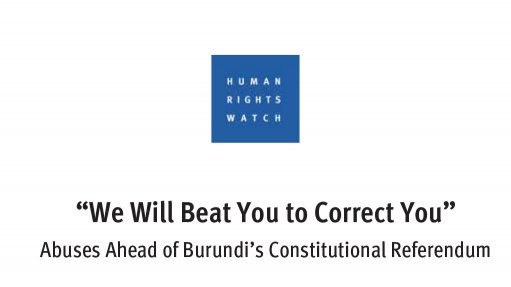
President Pierre Nkurunziza’s decision in April 2015 to stand for a disputed third term sparked a political, human rights, and humanitarian crisis which continues to have devastating consequences for many people in Burundi. Violence and intimidation against political opponents across the country escalated ahead of the May 17, 2018 constitutional referendum that would allow the president to extend his hold on power.
Since Nkurunziza made the first move in 2015 to extend his stay in power, Burundian state security forces, intelligence services, and members of the ruling party’s youth league, the Imbonerakure, have carried out brutal, targeted attacks on opponents or suspected opponents, human rights activists, and journalists–killing an estimated 1,700 people and forcibly disappearing, raping, torturing, beating, arbitrarily detaining, and intimidating countless others. According to the United Nations, over 390,000 Burundian refugees fled since the start of the crisis and remain outside of the country, and an estimated 3 million Burundians need humanitarian assistance–over a quarter of the country’s total population. The country’s once vibrant independent media and human rights organizations have been decimated, facing severe restrictions or being banned entirely, and many of their leaders have been arrested or forced into exile. Armed opposition groups have also attacked security forces and members of the ruling party since 2015, with some establishing rear bases in neighboring eastern Democratic Republic of Congo.
On May 11, 2018, unidentified assailants shot and hacked to death at least 26 people, including several children, in Ruhagarika village, Cibitoke province, near the Congolese border, in the single most deadly attack on civilians in Burundi for at least several years. At time of writing, it is unclear whether the attack was related to the referendum, but it highlights the precarious security situation around the referendum as actors from all sides have in the past resorted to violence.
The third (and current) term of Nkurunziza, who has been in power since 2005, was seen by many as a violation of the two five-year term limit set forth in the Arusha Accords–a political framework signed in 2000 that established a power-sharing agreement intended to end the country’s civil war–as well as the country’s 2005 constitution. Nkurunziza and his supporters argued that his first term should not count because he was elected by parliament instead of a direct vote.
While Nkurunziza’s third term was disputed, the constitution clearly did not permit him to stand again. To maintain power, the president and his party, the National Council for the Defense of Democracy-Forces for the Defense of Democracy (Conseil national pour la défense de la démocratie-Forces de défense de la démocratie, CNDD-FDD), called for a referendum to change the constitution to increase presidential terms to seven years, renewable only once. However, the clock on terms already served would be reset, enabling Nkurunziza to run for two new seven-year terms, in 2020 and 2027. The change could extend his rule until 2034.
Report by the Human Rights Watch